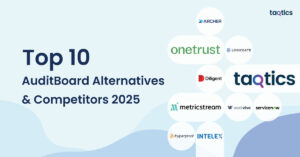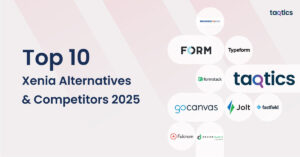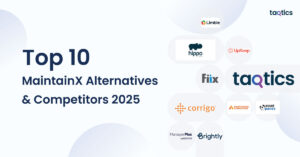Top 10 Zenput Alternatives & Competitors 2025
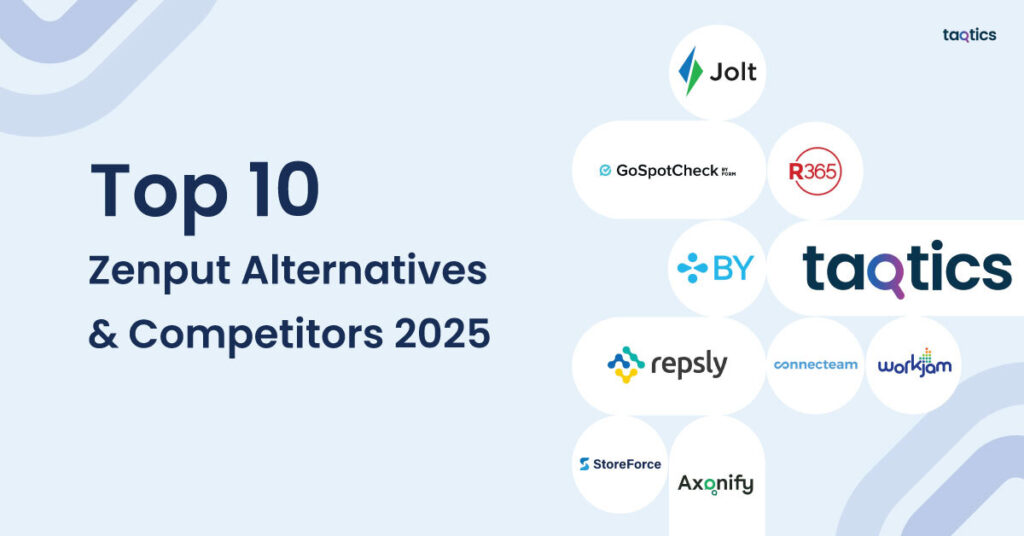
Zenput alternatives and competitors are gaining attention in 2025 as organizations look for more specialized, cost-effective, and scalable operations management platforms. While Zenput is a trusted choice for many multi-unit operators, particularly in retail, food service, and hospitality, it isn’t always the best fit for every organization.
Zenput has built a strong market presence with 100+ employees and estimated annual revenue between $5M–$25M, serving brands that demand consistency and compliance across multiple locations. The platform helps digitize audits, food safety, and daily execution tasks, offering teams real-time visibility into operations. According to TrustRadius and G2, Zenput is frequently compared to tools like Jolt, GoSpotCheck by FORM, and Restaurant365, reflecting its positioning in the operations and compliance niche.
In this guide, we highlight the Top 10 Zenput alternatives and competitors in 2025, examining their key features, pricing models, and unique advantages. By comparing these options, business leaders can make informed decisions aligned with their operational goals, industry-specific compliance needs, and scalability requirements.
What are the Best Zenput Alternatives?
- Taqtics – Best for Workflow Automation & Real-Time Dashboards
- Jolt – Best for Food Safety & HACCP Compliance
- GoSpotCheck by FORM – Best for Mobile Data Collection & Field Execution
- Restaurant365 – Best for Restaurant-Specific Operations & Accounting
- Connecteam – Best Budget-Friendly Workforce Management Suite
- WorkJam – Best All-in-One Frontline Orchestration Platform
- Blue Yonder (Luminate Commerce) – Best for Enterprise-Scale Supply Chain & Retail Execution
- Repsly – Best for CPG & Field Sales Execution
- StoreForce – Best for Specialty Retail Workforce Optimization
- Axonify – Best for Frontline Microlearning & Continuous Training
What is Zenput?
Zenput is an operations execution and compliance platform designed for multi-unit businesses such as restaurants, retail chains, and hospitality groups. It enables organizations to digitize daily checklists, audits, food safety processes, and operational workflows, helping teams ensure consistency, safety, and quality across all locations. By providing managers with real-time visibility into task completion and compliance, Zenput helps brands enforce standards, reduce risks, and drive operational excellence at scale.
Here are some of Zenput’s primary features:
- Digital Checklists & Task Management – Standardize daily operational tasks and track completion in real time.
- Food Safety & Compliance Automation – Monitor critical food safety processes with IoT sensors, automated temperature tracking, and digital HACCP logs.
- Audit & Inspection Tools – Digitize audits, SOP compliance, and quality checks with photo and geo-tagged proof.
- Issue Tracking & Resolution – Identify problems on-site and trigger automated workflows for corrective actions.
- Real-Time Dashboards & Analytics – Provide leadership teams with visibility into compliance trends, completion rates, and performance metrics.
- Mobile-First Design – Empower frontline employees with easy-to-use mobile apps that fit into daily workflows.
- Multi-Location Scalability – Built to handle the complexity of managing hundreds of locations consistently.
- Integrations – Connect with other enterprise tools such as HR, workforce management, and reporting systems.
Zenput operates on a custom, quote-based pricing model that varies depending on the number of locations, modules, and integrations required. Organizations can request a demo to explore how Zenput’s task execution and compliance tools fit into their operational environment.
1. Taqtics
Taqtics is a cloud-based operations management platform designed for retail, restaurant, and multi-location businesses. It helps organizations digitize SOP checklists, audits, merchandising compliance, training, and issue tracking, all accessible through mobile and web. Its strength lies in enabling real-time visibility, AI-backed compliance, and automated workflows—helping teams replace fragmented spreadsheets and manual reporting with streamlined digital processes.
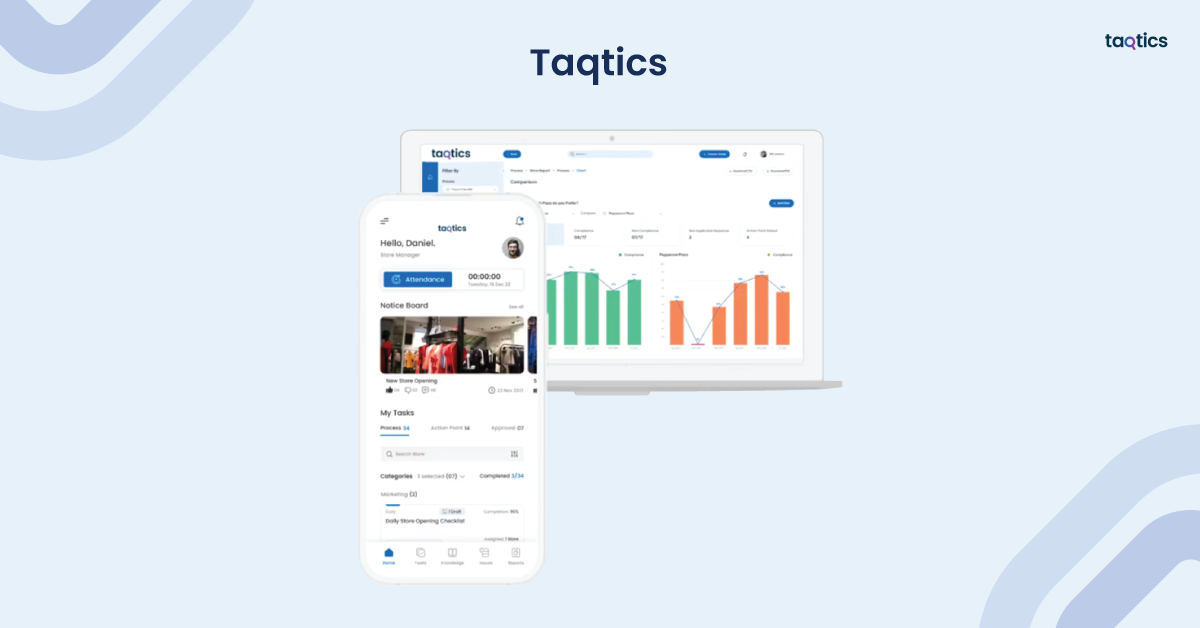
Let, check out some of the use cases for Taqtics
- Retail Operations: Retail chains use Taqtics to digitize SOPs, track merchandising compliance with AI-powered photo validation, and measure store readiness. Dashboards offer leadership visibility into performance across hundreds of stores, with case studies showing compliance rates reaching 95%.
- Restaurants & Food Service: Restaurants rely on Taqtics for food safety audits, staff training, and asset maintenance. Features like geo-fenced check-ins and photo proof reduce inspection times and improve regulatory adherence.
- Manufacturing & Supply Chain: Manufacturing plants adopt Taqtics for QA audits, safety compliance, and asset lifecycle tracking. Automated maintenance reminders and ticketing cut downtime by up to 87%, boosting production efficiency.
What are the key features of Taqtics
- Customizable digital checklists with geo-fencing & photo uploads
- AI-powered visual merchandising compliance validation
- Standardized audits with scoring and corrective action workflows
- Barcode-based asset tracking with maintenance reminders
- Real-time dashboards, heatmaps, and report exports (Excel/PDF/PPT)
- Ticketing system with issue escalation protocols
- Attendance management with GPS validation
- Mobile-first training and microlearning modules with assessments
- Multilingual support for diverse teams
- API integrations for scalability and interoperability
Plans & Pricing of Taqtics
- Free Trial – Available (no credit card required)
- Free Plan – Not officially confirmed; pricing depends on team size, modules, and location count
- Paid Plans – Custom quotes based on business requirements; customers report fast turnaround on proposals
What are Taqtics’ Reviews on Other Platforms
| Platform | Ease of Use | Value for Money | Customer Support | Features |
| Software Advice | 4.8 / 5 | 4.9 / 5 | 5.0 / 5 | 4.4 / 5 |
| Capterra | 5.0 / 5 | 4.0 / 5 | 5.0 / 5 | 2.0 / 5 |
| Capterra (Alt) | 4.8 / 5 | 4.9 / 5 | 5.0 / 5 | 4.4 / 5 |
Taqtics Customer Support
Taqtics is highly rated for its responsive support, with nearly all reviewers citing fast resolution and effective onboarding. Many brands report successful deployment across dozens of stores within weeks.
Here are their contact details:
- Sales Inquiries: sales@taqtics.co
- Contact Number: +91 98451 77744
- Address: Peachy Technologies Pvt Ltd, 3rd Floor, 572, 3rd Main Rd, Above Starbucks, P&T Colony, RT Nagar, Bengaluru, Karnataka 560032
Pros & Cons of Taqtics
| Pros | Cons |
| Intuitive, mobile-first interface easy to roll out across locations | Pricing is opaque; requires custom quotes |
| AI-powered audits & automation (95% compliance rates, 87% faster issues) | Dashboards could be more interactive/customizable |
| Comprehensive suite: audits, ticketing, training, asset tracking in one | Workflow customization may be complex for non-technical teams |
| Highly responsive and proactive support | Reporting exports (Excel/PDF) feel clunky for some users |
Ready to streamline your operations?
Experience the power of Taqtics today — try it now for free!
2. Jolt
Jolt is an operations management platform built for restaurants, food service providers, retail, and hospitality industries. It digitizes critical processes such as food safety compliance, temperature monitoring, daily checklists, scheduling, and task management. With IoT integrations and automation features, Jolt helps businesses maintain health standards, reduce risks, and streamline multi-location operations.
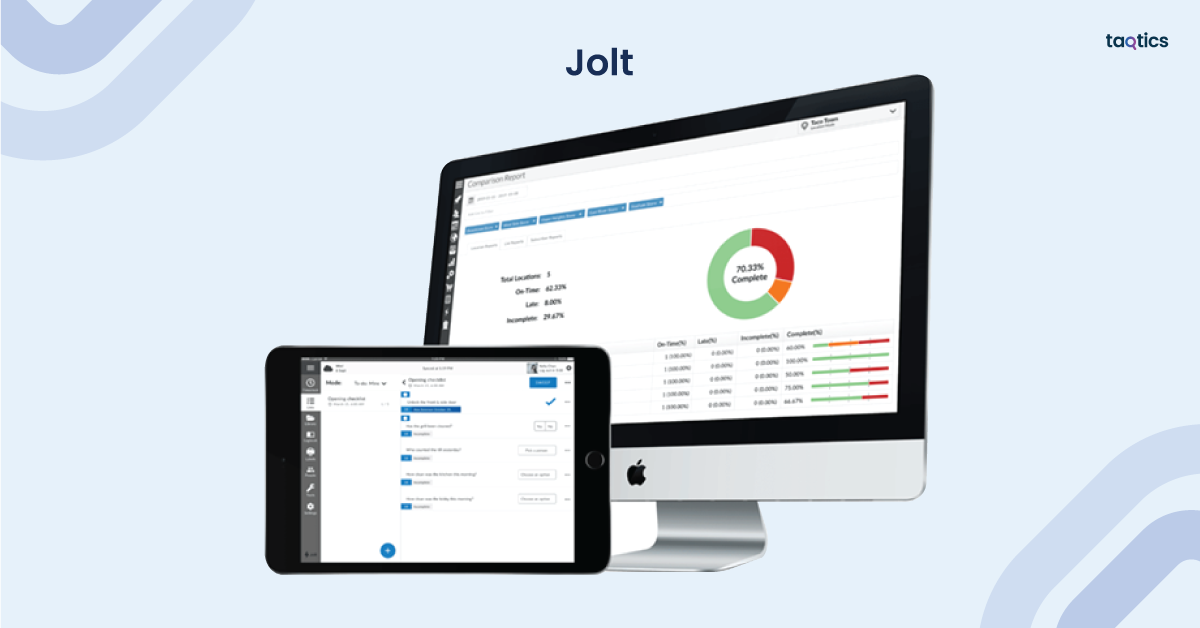
So, let’s see some of the use cases for Jolt
- Food Safety & HACCP Compliance: Replace manual food safety logs with digital checklists and IoT-powered temperature monitoring. Automated alerts improve food safety, minimize risks, and ensure regulatory compliance.
- Smart Label Printing & Date Coding: Automate food prep labeling and expiration tracking to reduce errors, improve consistency, and cut down waste.
- Multi-Location Consistency & Accountability: Enable franchises and chains to monitor performance, track completion with photo proof, and maintain compliance across all sites with real-time dashboards.
What are the key features of Jolt?
- Digital checklists for daily restaurant and retail operations
- IoT-powered temperature tracking with real-time alerts
- Automated expiry label printing and date coding
- Task management with proof-of-work (photos, notes)
- Employee scheduling and time tracking (QR code and facial recognition clock-in)
- Document and SOP library for standardized workflows
- Multi-location dashboards for compliance and accountability
Plans & Pricing of Jolt
- Custom Pricing Model – Based on modules and number of locations
- Example Pricing – A single location: ~$296.79/month with a $549 setup fee
- Discounted Pricing – Multi-location bundles: ~$166.20/month per location (for 4 locations)
What are Jolt’s reviews on other platforms?
| Platform | Ease of Use | Value for Money | Customer Support | Features |
| Software Advice | 4.5 / 5 | 4.6 / 5 | 4.7 / 5 | 4.5 / 5 |
| GetApp | 4.5 / 5 | 4.6 / 5 | 4.7 / 5 | 4.5 / 5 |
| G2 | — | — | — | Overall: 4.6 / 5 (26 reviews) |
Jolt Customer Support
Jolt is consistently praised for its fast and proactive customer support. Users highlight smooth onboarding, prompt troubleshooting, and thorough deployment assistance.
- Email: support@jolt.com
- Phone: 877-396-4112 (ext. 1)
Pros & Cons of Jolt
| Pros | Cons |
| Deep focus on food safety: IoT temperature monitoring & digital HACCP logs | Pricing is on the higher side; limited transparency for smaller businesses |
| Automated food labeling reduces waste and improves compliance | Occasional app glitches and performance issues reported |
| Intuitive, mobile-friendly interface with real-time visibility | Lacks advanced workforce management tools like GPS-based scheduling |
| Multi-location dashboards improve compliance and accountability | Navigation and menu flows can feel complex for new users |
| Strong, responsive customer support during rollout and beyond | Some features (auto-scheduling, integrations) require extra configuration |
3. GoSpotCheck by FORM
GoSpotCheck by FORM is a mobile-first field execution and data collection platform designed for retail, consumer goods, hospitality, and food service businesses. It empowers field teams to capture real-time data, complete digital checklists, and validate compliance with photo proof. By combining task execution, visual merchandising audits, and performance analytics, GoSpotCheck helps enterprises drive accountability and ensure operational standards across distributed locations.
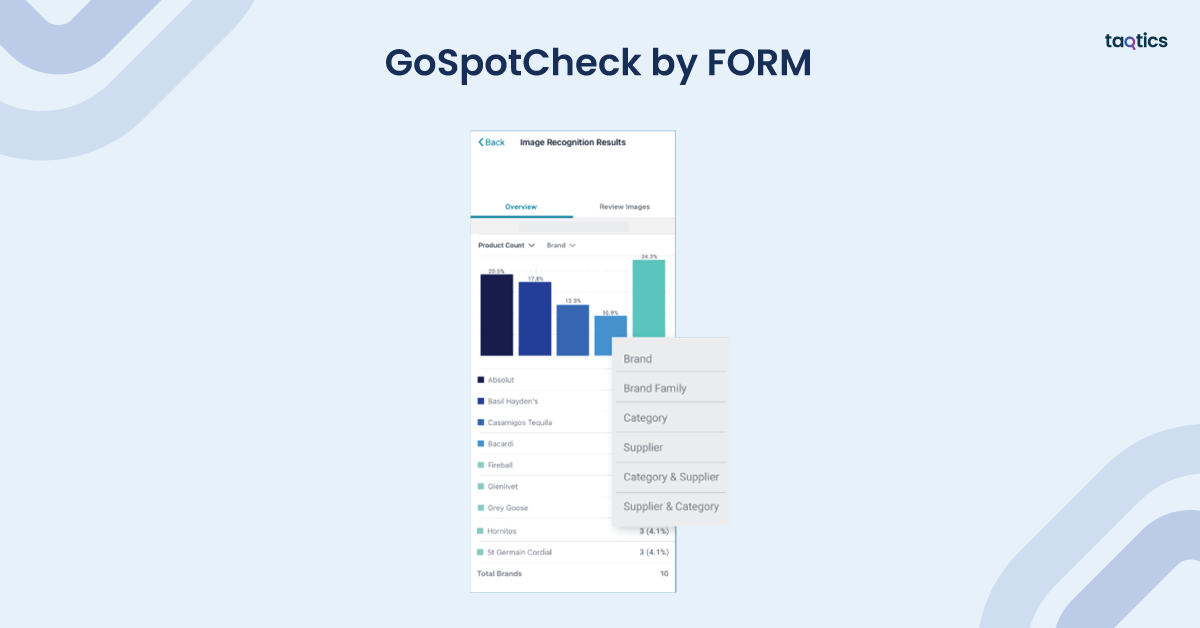
So, what are the use cases for GoSpotCheck
- Retail Execution & Merchandising: Enables store teams and merchandisers to capture shelf data, validate planograms, and submit photos for compliance checks.
- Consumer Packaged Goods (CPG): Allows field sales teams to log visit data, capture competitor insights, and track in-store promotions for improved visibility.
- Hospitality & Food Service: Digitizes location inspections, brand audits, and operational checklists to standardize quality across franchises and outlets.
What are the key features of GoSpotCheck?
- Digital checklists and task management with real-time sync
- Photo and video capture with AI validation for merchandising compliance
- GPS tracking and geo-fenced task assignments
- Workflow automation for issue escalation and corrective actions
- Mobile app with offline capabilities for field teams
- Real-time analytics dashboards for leadership teams
- Integration with enterprise systems (ERP, CRM, and BI tools)
Plans & Pricing of GoSpotCheck
- Custom Pricing Model – Tailored to enterprise needs, based on users, modules, and integrations
- Free Trial – Available on request
- No public pricing listed; must contact FORM for a demo and proposal
What are GoSpotCheck’s reviews on other platforms
| Platform | Ease of Use | Value for Money | Customer Support | Features |
| Software Advice | 4.5 / 5 | 4.6 / 5 | 4.7 / 5 | 4.6 / 5 |
| Capterra | 4.4 / 5 | 4.5 / 5 | 4.6 / 5 | 4.5 / 5 |
| GetApp | 4.4 / 5 | 4.5 / 5 | 4.6 / 5 | 4.5 / 5 |
GoSpotCheck Customer Support
GoSpotCheck has a strong reputation for enterprise-level customer support, offering guided onboarding, training, and quick resolution of technical issues. Users highlight their dedicated account managers and fast response times.
- Support Email: support@gospotcheck.com
- Phone: +1 720-773-8800
Pros & Cons of GoSpotCheck
| Pros | Cons |
| Excellent for retail execution and visual merchandising audits | Pricing is opaque and tailored to enterprises only |
| Mobile-first, offline-friendly design for field teams | Setup and customization can be complex for smaller businesses |
| Photo and video proof with AI validation enhances compliance | Some users report sync delays on low connectivity |
| Integrates seamlessly with ERP/CRM/BI systems | Best suited for mid-to-large enterprises, less ideal for SMBs |
| Dedicated account managers and enterprise-grade support | Feature-rich platform requires training for full adoption |
4. Restaurant365
Restaurant365 is an all-in-one restaurant management platform that unifies accounting, inventory, scheduling, payroll, and back-office operations. Designed specifically for restaurants and multi-unit food service businesses, Restaurant365 helps operators streamline financial management, reduce food costs, optimize labor, and improve overall operational efficiency. Its integrated cloud-based system eliminates the need for multiple standalone solutions, making it a go-to platform for restaurant operators seeking centralization and automation.
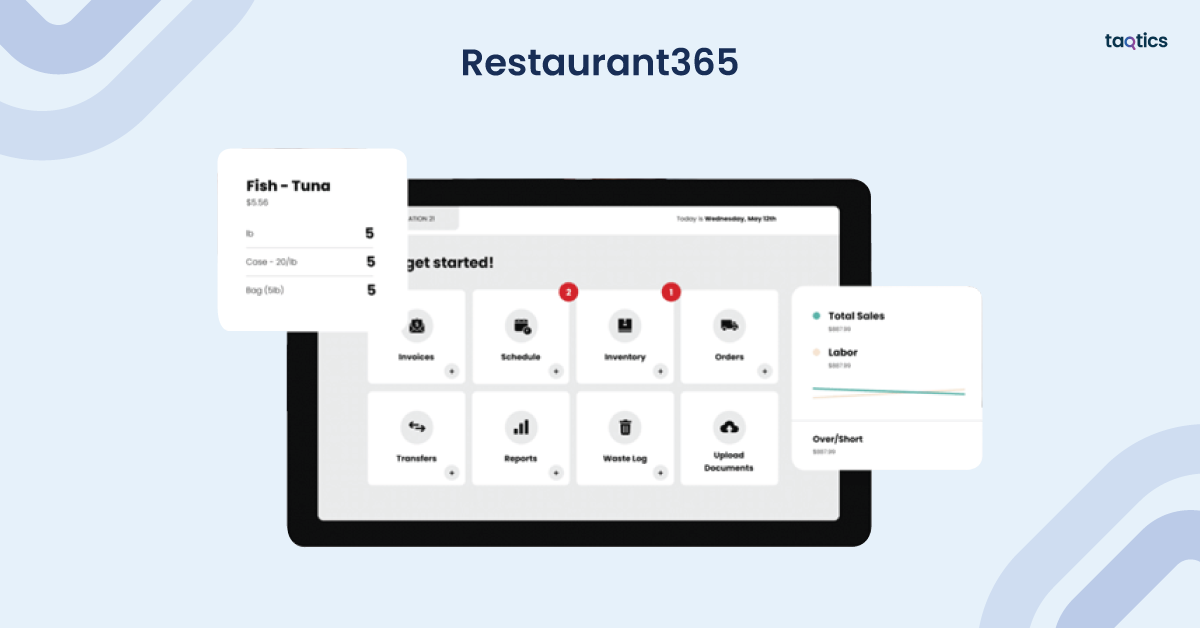
Let’s study some of the use cases for Restaurant365
- Restaurant Accounting & Financial Management: Automates AP, AR, bank reconciliation, and financial reporting tailored to the food service industry.
- Inventory & Recipe Management: Tracks food usage, reduces waste, and improves cost controls with recipe costing and real-time inventory updates.
- Labor & Payroll: Integrates scheduling, time tracking, and payroll processing to optimize labor costs and ensure compliance with labor laws.
- Multi-Unit Restaurant Groups: Offers centralized reporting and dashboards for franchise owners and operators managing multiple locations.
What are the key features of Restaurant365?
- Integrated accounting platform built for restaurants
- Real-time inventory and recipe costing tools
- Automated invoice processing and vendor management
- Labor scheduling, time clock, and payroll integration
- Centralized financial dashboards and analytics
- Mobile access for managers and operators
- Third-party integrations with POS systems, payroll providers, and suppliers
Plans & Pricing of Restaurant365
- Pricing – Custom, based on modules and business size
- Free Trial – Available on request
- Reports suggest Restaurant365 offers modular plans that scale with business needs (Accounting, Operations, Workforce)
What are Restaurant365’s reviews on other platforms?
| Platform | Ease of Use | Value for Money | Customer Support | Features |
| Software Advice | 4.1 / 5 | 4.0 / 5 | 4.0 / 5 | 4.2 / 5 |
| Capterra | 4.1 / 5 | 4.0 / 5 | 4.0 / 5 | 4.2 / 5 |
| GetApp | 4.1 / 5 | 4.0 / 5 | 4.0 / 5 | 4.2 / 5 |
Restaurant365 Customer Support
Restaurant365 provides strong onboarding and dedicated support for enterprise clients. While many users note responsive service, some small to mid-size operators have reported longer resolution times for technical issues.
- Support Portal: help.restaurant365.com
- Phone: (888) 488-5555
Pros & Cons of Restaurant365
| Pros | Cons |
| Purpose-built for restaurants, unifying accounting, inventory, and payroll | Pricing not transparent; custom quotes required |
| Recipe costing and inventory management reduce food costs | Learning curve can be steep for non-accounting staff |
| Eliminates need for multiple software tools | Occasional bugs and performance lags reported |
| Strong integrations with POS and payroll systems | Smaller restaurants may find it expensive compared to simpler tools |
| Modular plans scale with multi-unit operators | Customer support response times can be slower for SMBs |
5. Connecteam
Connecteam is a mobile-first workforce management platform built for deskless and frontline teams. It brings together employee scheduling, time tracking, communication, task management, and training into one centralized app. Designed for industries such as retail, hospitality, logistics, construction, and healthcare, Connecteam helps organizations improve efficiency, reduce administrative overhead, and strengthen workforce engagement, all at a budget-friendly price point.
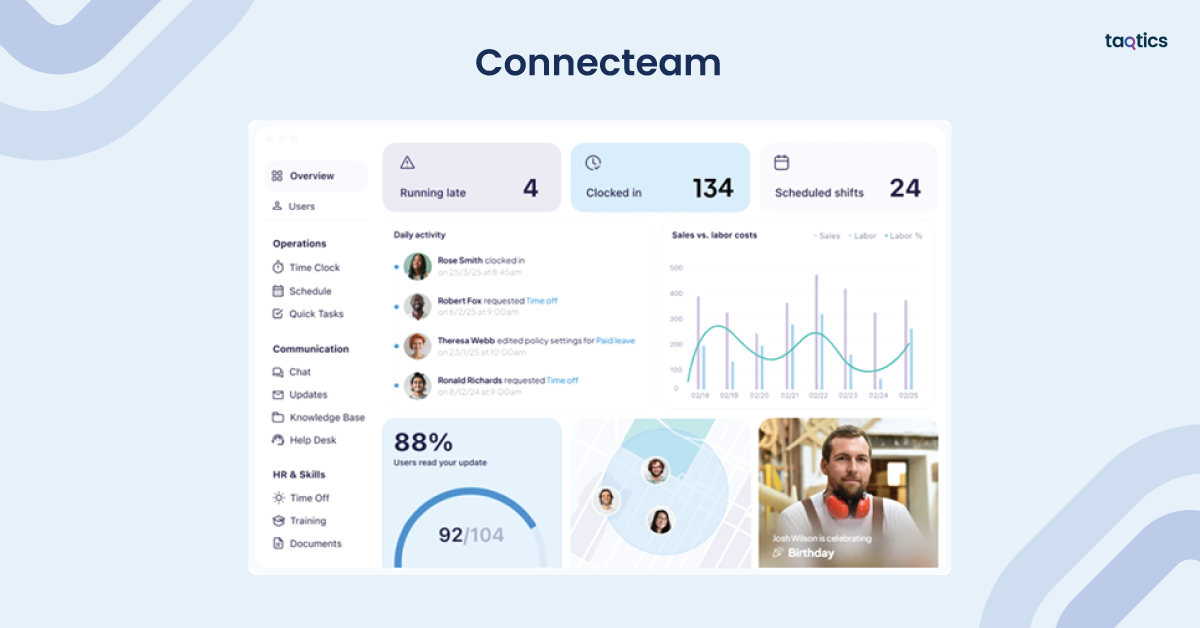
So, let’s have a look at some of the use cases for Connecteam
- Retail & Hospitality: Manage shift scheduling, attendance, and task completion across multiple locations with real-time visibility.
- Logistics & Field Services: Track time, manage routes, and communicate directly with drivers and field employees.
- Healthcare & Non-Profits: Streamline workforce communication, compliance training, and shift coverage for distributed teams.
- Construction & Manufacturing: Assign tasks, monitor safety checklists, and provide training for on-site workers.
What are the key features of Connecteam?
- Shift scheduling with drag-and-drop functionality
- GPS-enabled time clock with geofencing
- Task and project management tools for frontline teams
- In-app chat, announcements, and employee directory
- Knowledge base and resource center for SOPs and training materials
- Mobile-first design for on-the-go accessibility
- Reporting and analytics dashboards
- Integrations with payroll and HR systems
Plans & Pricing of Connecteam
- Free Plan – Available for up to 10 users
- Basic Plan – Starting at $29/month for the first 30 users
- Advanced & Expert Plans – Offer enhanced analytics, integrations, and automation features
- Enterprise Plan – Custom pricing for large organizations
What are Connecteam’s reviews on other platforms?
| Platform | Ease of Use | Value for Money | Customer Support | Features |
| Software Advice | 4.8 / 5 | 4.9 / 5 | 4.9 / 5 | 4.8 / 5 |
| Capterra | 4.8 / 5 | 4.9 / 5 | 4.9 / 5 | 4.8 / 5 |
| GetApp | 4.8 / 5 | 4.9 / 5 | 4.9 / 5 | 4.8 / 5 |
Connecteam Customer Support
Connecteam is well-regarded for its fast and responsive support, with many users highlighting live chat assistance and a dedicated customer success team. Onboarding is reported to be smooth, even for large teams.
- Support Email: info@connecteam.com
- Phone: +1 (866) 610-1654
Pros & Cons of Connecteam
| Pros | Cons |
| Affordable pricing with free plan for small teams | Feature depth may be limited compared to enterprise-grade platforms |
| Intuitive, mobile-first interface for deskless workers | Some integrations are available only on higher-tier plans |
| Robust scheduling, time tracking, and communication tools in one app | Reporting and analytics could be more advanced |
| Excellent customer support with live chat and dedicated success managers | Limited offline functionality in certain modules |
| Highly customizable with role-based access | May require training for managers new to digital workforce tools |
6. WorkJam
WorkJam is a digital frontline workforce platform designed to unify communication, task management, learning, scheduling, and employee engagement in a single mobile-first application. Built for industries such as retail, hospitality, healthcare, logistics, and manufacturing, WorkJam empowers businesses to improve frontline productivity, reduce turnover, and drive operational excellence across large, distributed workforces.
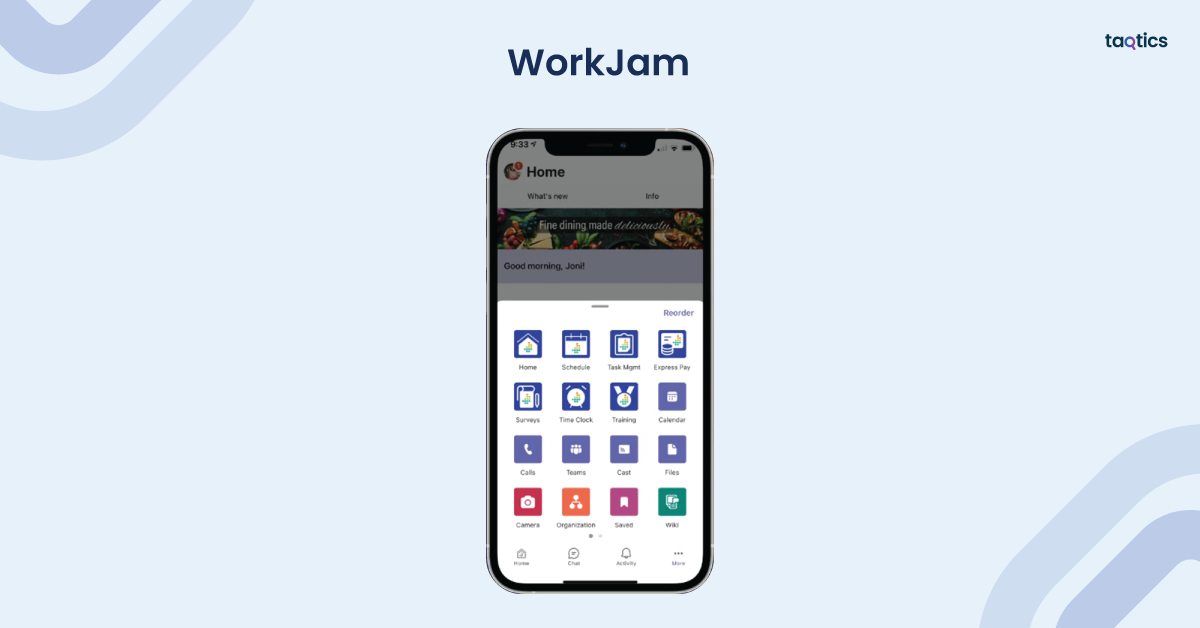
Now, let’s go through some of the use cases for WorkJam
- Retail & Hospitality:Manage shift scheduling, team communication, and compliance audits across multi-unit locations.
- Healthcare & Manufacturing: Provide real-time updates, training modules, and checklists to frontline employees for consistent operations.
- Logistics & Transportation: Optimize scheduling, assign delivery/route tasks, and keep mobile workforces aligned.
- Employee Engagement: Enhance motivation and retention through recognition tools, feedback surveys, and career development modules.
What are the key features of WorkJam?
- Shift scheduling and self-service shift swapping
- Task management with real-time completion tracking
- In-app communication: chat, announcements, and surveys
- Microlearning and frontline training modules
- Recognition and rewards to boost employee engagement
- Mobile-first design with multilingual support
- Compliance tools and SOP standardization
- Integrations with HR, payroll, and workforce systems
Plans & Pricing of WorkJam
- Custom Pricing Model – Tailored to organization size, number of users, and feature set
- No Free Plan – Enterprise-level solution
- Demo Available – Businesses can request personalized demos and proposals from the WorkJam team
What are WorkJam’s reviews on other platforms?
| Platform | Ease of Use | Value for Money | Customer Support | Features |
| Software Advice | 4.2 / 5 | 4.1 / 5 | 4.0 / 5 | 4.2 / 5 |
| Capterra | 4.2 / 5 | 4.1 / 5 | 4.0 / 5 | 4.2 / 5 |
| GetApp | 4.2 / 5 | 4.1 / 5 | 4.0 / 5 | 4.2 / 5 |
WorkJam Customer Support
WorkJam provides enterprise-level support with dedicated account managers and onboarding specialists. While many users highlight structured implementation and strong training programs, others note slower response times compared to mid-market competitors.
- Support Email: info@workjam.com
- Website: www.workjam.com
Pros & Cons of WorkJam
| Pros | Cons |
| All-in-one frontline workforce orchestration platform | Pricing not transparent; requires enterprise quote |
| Combines communication, scheduling, tasking, and learning in one app | Some users report slower customer support response times |
| Mobile-first design with multilingual and offline support | Complexity may overwhelm smaller businesses |
| Boosts engagement with recognition, surveys, and gamification tools | Implementation can take longer for large enterprises |
| Strong integrations with HR and payroll systems | Higher cost compared to mid-market solutions |
7. Blue Yonder (Luminate Commerce)
Blue Yonder is an enterprise-grade retail and supply chain execution platform that leverages AI, machine learning, and advanced analytics to optimize demand forecasting, merchandising, workforce planning, and omnichannel execution. It is best suited for large retailers, grocery chains, and global enterprises seeking deep visibility, automation, and scalability across their supply chain and store operations.
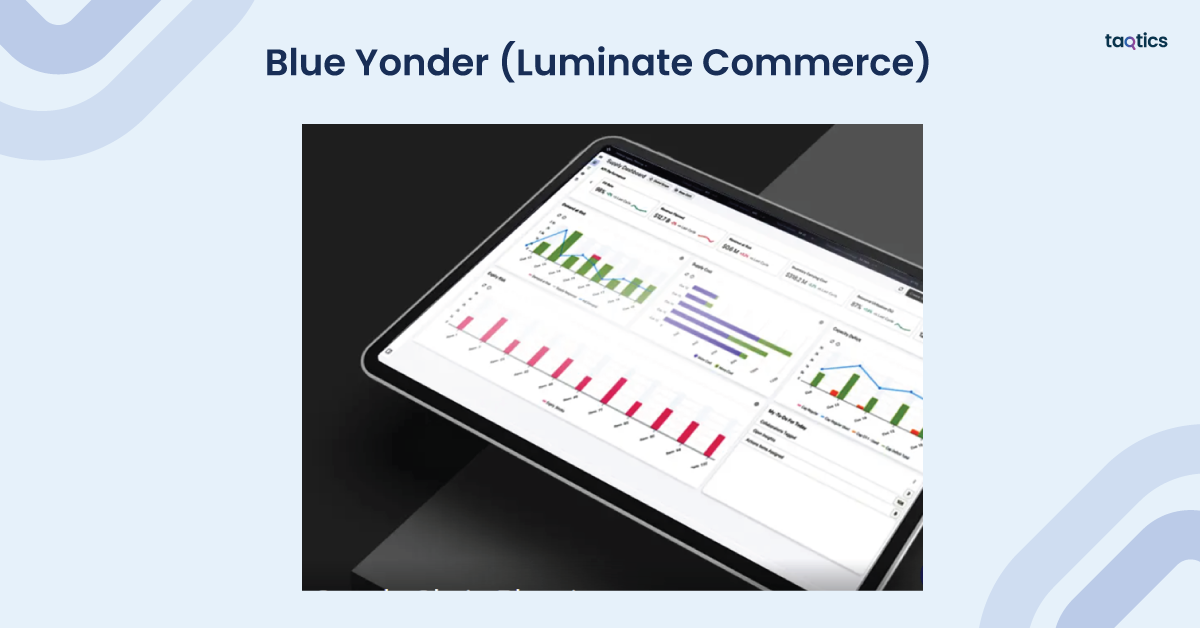
Now, let check some of the use cases of Blue Yonder
- Retail & Grocery Chains: Forecast demand, manage pricing, and optimize inventory across thousands of SKUs and multiple locations.
- Supply Chain Optimization: Streamline procurement, demand planning, and warehouse operations with AI-driven automation.
- Workforce Planning: Allocate labor resources effectively with predictive scheduling and productivity analytics.
- Omnichannel Execution: Unify online and offline channels with real-time insights into inventory, orders, and customer demand.
What are the key features of Blue Yonder?
- AI-powered demand forecasting and pricing optimization
- End-to-end supply chain management tools
- Real-time inventory visibility and replenishment
- Workforce planning and predictive scheduling
- Omnichannel execution with unified commerce insights
- Analytics dashboards with scenario planning capabilities
- Cloud-native, scalable architecture for global enterprises
Plans & Pricing of Blue Yonder
- Custom Pricing Model – Tailored to enterprise scale, modules, and deployment complexity
- Free Trial – Not available; enterprise demo can be requested
- Implementation – Typically requires custom onboarding and enterprise-grade support
What are Blue Yonder’s reviews on other platforms?
| Platform | Ease of Use | Value for Money | Customer Support | Features |
| Software Advice | 4.0 / 5 | 3.9 / 5 | 4.0 / 5 | 4.2 / 5 |
| Capterra | 4.0 / 5 | 3.9 / 5 | 4.0 / 5 | 4.2 / 5 |
| GetApp | 4.0 / 5 | 3.9 / 5 | 4.0 / 5 | 4.2 / 5 |
Blue Yonder Customer Support
Blue Yonder provides enterprise-level support through dedicated account managers, training programs, and 24/7 service packages for global clients. While praised for strong implementation guidance, some enterprises report that issue resolution may take time due to platform complexity.
- Support Website: support.blueyonder.com
- Phone: Available for enterprise clients (regional hotlines)
Pros & Cons of Blue Yonder
| Pros | Cons |
| AI-driven demand forecasting and supply chain optimization | Pricing is opaque and tailored for large enterprises |
| Scalable, cloud-native architecture for global retail operations | Implementation is complex and requires significant time and resources |
| Strong workforce planning and predictive scheduling tools | Best suited for large enterprises, not ideal for SMBs |
| Omnichannel execution with unified customer and inventory insights | Steeper learning curve due to feature-rich platform |
| Comprehensive analytics with scenario planning capabilities | Customer support response times may vary for mid-tier clients |
8. Repsly
Repsly is a retail execution and field sales management software designed specifically for Consumer Packaged Goods (CPG) companies. It enables field teams to capture store-level data, track merchandising compliance, monitor promotional activities, and manage customer relationships in real time. With its mobile-first approach, Repsly empowers sales representatives and managers with the tools to improve in-store execution, visibility, and decision-making.
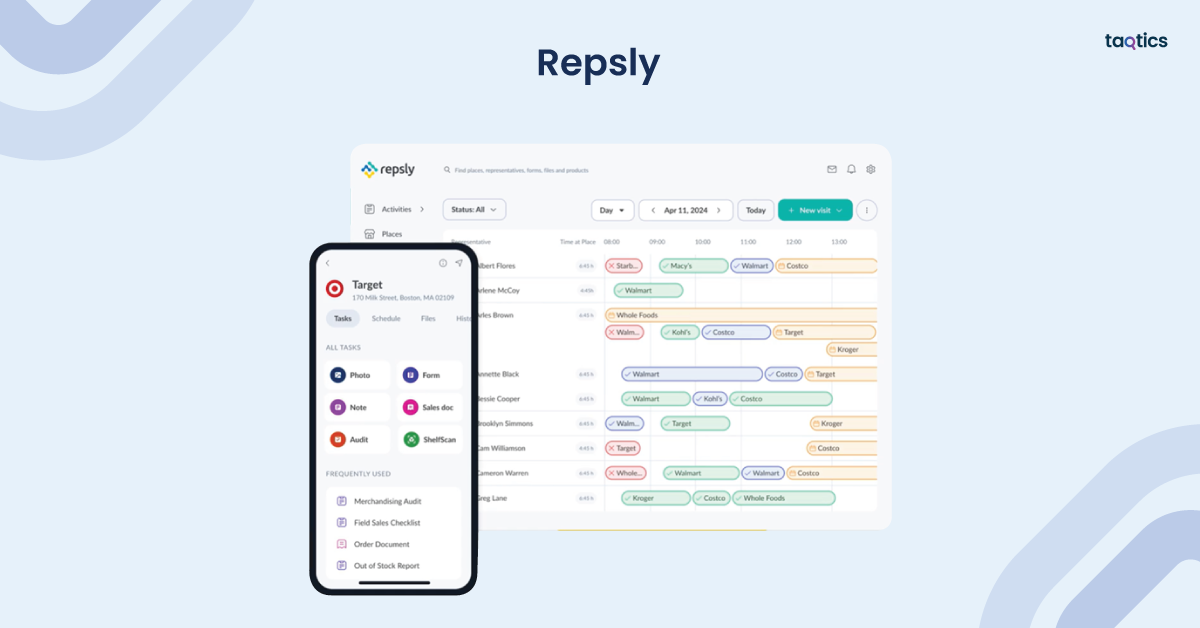
Now, let us have a look at some of the use cases for Repsly
- CPG Sales Teams – Manage field sales visits, capture orders, and track competitor activities to boost sales performance.
- Merchandising Compliance – Validate planograms, promotions, and shelf displays with photo proof and compliance scoring.
- Retail Execution – Enable reps to execute in-store audits, collect feedback, and share real-time insights with headquarters.
- Account & Territory Management – Assign routes, manage customer accounts, and optimize territory planning.
What are the key features of Repsly?
- Retail execution tools for audits, surveys, and compliance checks
- Photo capture and time-stamped proof of in-store activities
- GPS tracking and route optimization for field sales reps
- Customer relationship management (CRM) functionality
- Order capture and sales tracking in the field
- Real-time reporting dashboards with team performance analytics
- Integration with ERP, CRM, and BI systems
- Mobile-first design with offline capabilities
Plans & Pricing of Repsly
- Standard Plan – $39/user/month (billed annually)
- Plus Plan – $59/user/month (billed annually) with advanced reporting and API integrations
- Pro Plan – $79/user/month (billed annually) with advanced automation and territory management
- Enterprise – Custom pricing with tailored features and support
What are Repsly’s reviews on other platforms?
| Platform | Ease of Use | Value for Money | Customer Support | Features |
| Software Advice | 4.5 / 5 | 4.5 / 5 | 4.4 / 5 | 4.4 / 5 |
| Capterra | 4.5 / 5 | 4.5 / 5 | 4.4 / 5 | 4.4 / 5 |
| GetApp | 4.5 / 5 | 4.5 / 5 | 4.4 / 5 | 4.4 / 5 |
Repsly Customer Support
Repsly is appreciated for its responsive customer support, particularly for onboarding new teams. Users highlight the availability of training resources and dedicated account managers. However, some reviews mention delays in resolving highly technical issues.
- Support Email: support@repsly.com
- Website: www.repsly.com
Pros & Cons of Repsly
| Pros | Cons |
| Purpose-built for CPG and retail execution | Pricing may be high for small teams |
| Strong photo validation and compliance tracking features | Some advanced features are limited to higher-tier plans |
| Mobile-first platform with offline support | Reports of occasional syncing issues in low connectivity areas |
| Real-time analytics dashboards with sales and compliance data | Not as flexible for industries outside CPG and retail |
| Easy-to-use interface for field reps and managers | Complex reporting customization requires technical support |
9. StoreForce
StoreForce is a workforce management and retail performance platform designed specifically for specialty retail chains. It helps retailers improve labor planning, store execution, and employee performance through real-time insights and operational tools. Built with retail DNA, StoreForce enables organizations to align labor costs with sales opportunities, drive productivity, and deliver a consistent customer experience across all store locations.
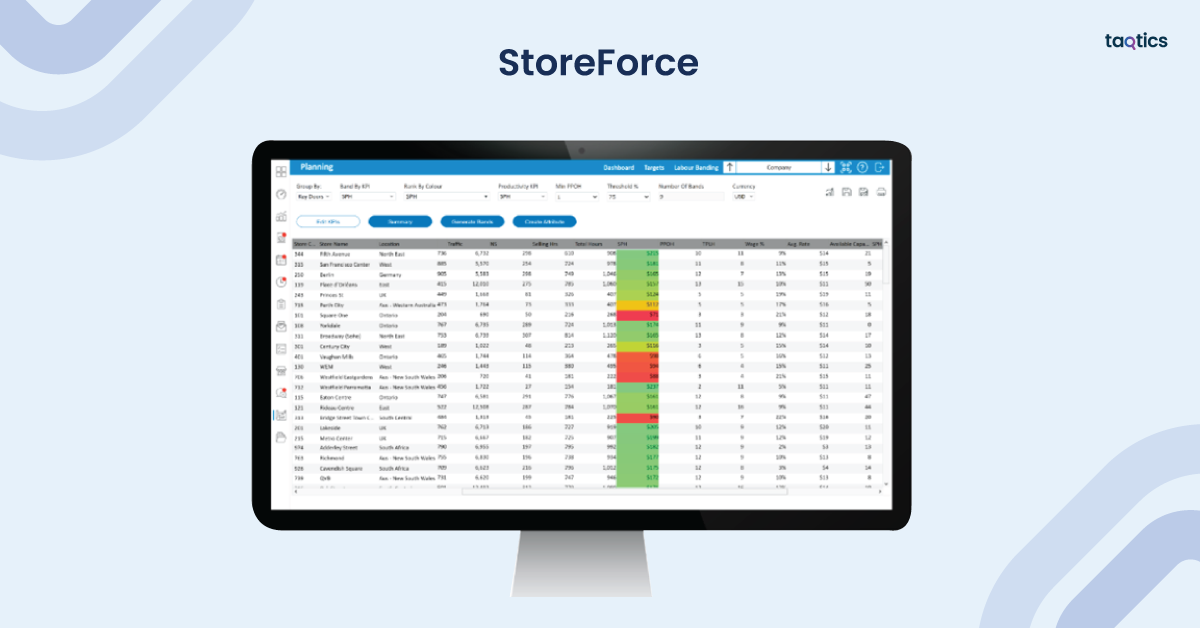
So, what are the use cases for StoreForce?
- Specialty Retail Chains – Optimize workforce allocation, task execution, and sales performance across multiple stores.
- Labor Optimization – Forecast labor demand, align staffing with traffic and sales data, and reduce overtime costs.
- Store Performance Management – Monitor KPIs, sales performance, and task completion with real-time dashboards.
- Employee Engagement – Enhance communication and empower associates with performance feedback and recognition tools.
What are the key features of StoreForce?
- Workforce planning and predictive labor scheduling
- Task and checklist management for store operations
- Real-time dashboards with store and employee performance metrics
- Mobile-first interface for managers and associates
- KPI tracking with sales and traffic alignment
- Employee engagement tools: recognition, performance feedback, and goals
- Integrations with POS, payroll, and HR systems
Plans & Pricing of StoreForce
- Custom Pricing Model – Tailored to business size, store count, and modules selected
- Free Trial – Not publicly available, demo upon request
- Enterprise Deployment – Designed for mid-sized to large specialty retail brands
What are StoreForce’s reviews on other platforms?
| Platform | Ease of Use | Value for Money | Customer Support | Features |
| Software Advice | 4.6 / 5 | 4.5 / 5 | 4.7 / 5 | 4.6 / 5 |
| Capterra | 4.6 / 5 | 4.5 / 5 | 4.7 / 5 | 4.6 / 5 |
| GetApp | 4.6 / 5 | 4.5 / 5 | 4.7 / 5 | 4.6 / 5 |
StoreForce Customer Support
StoreForce is praised for its dedicated retail-focused support, with many customers noting quick onboarding and proactive guidance from account managers. Support response times are fast, but resolution for complex integration issues may take longer.
- Support Email: support@storeforcesolutions.com
- Website: www.storeforcesolutions.com
Pros & Cons of StoreForce
| Pros | Cons |
| Purpose-built for specialty retail with retail-specific KPIs | Pricing not transparent; requires enterprise quote |
| Strong workforce planning and labor optimization tools | Best suited for specialty retail; limited use outside retail industry |
| Real-time performance dashboards with store and employee metrics | Advanced reporting customization can be complex |
| Employee engagement tools improve morale and accountability | Implementation requires training and proper change management |
| Excellent customer support with retail expertise | May be costly for smaller retail businesses |
10. Axonify
Axonify is a frontline training and microlearning platform designed to deliver personalized, bite-sized learning experiences that improve employee knowledge, compliance, and performance. It uses adaptive learning, gamification, and reinforcement strategies to keep employees engaged and continuously developing their skills. Axonify is widely adopted in industries such as retail, logistics, food service, and financial services where frontline engagement and compliance are critical.
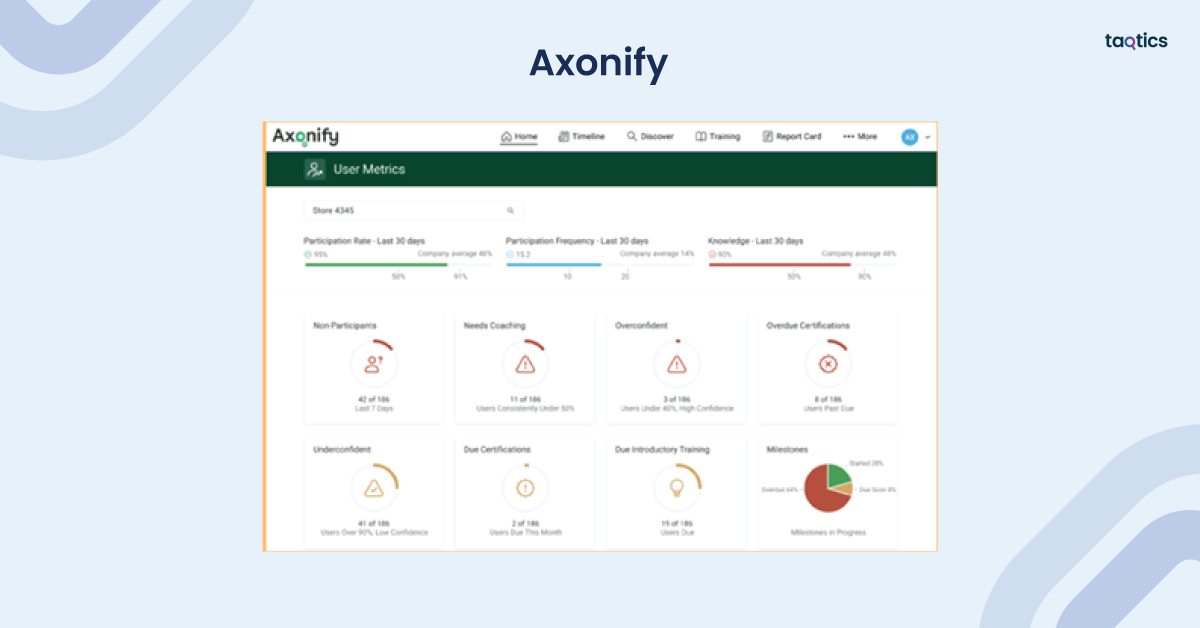
Now, let’s have a look at the use cases for Axonify.
- Retail & Hospitality – Provide employees with quick, targeted training modules on customer service, safety, and product knowledge.
- Logistics & Manufacturing – Reinforce workplace safety protocols and process knowledge with continuous microlearning.
- Financial Services & Banking – Train employees on compliance, regulations, and customer engagement best practices.
- Food Service & Quick Service Restaurants (QSRs) – Deliver onboarding and food safety training in short, gamified sessions.
What are the key features of Axonify?
- Adaptive microlearning tailored to individual employees
- Gamification elements including points, leaderboards, and rewards
- Reinforcement learning to boost knowledge retention
- Content library plus custom content creation tools
- Analytics dashboards to measure training impact and employee progress
- Mobile-first design for frontline accessibility
- Integration with LMS, HR, and workforce systems
Plans & Pricing of Axonify
- Custom Pricing Model – Based on organization size, user count, and training requirements
- Free Trial – Not publicly available
- Demo – Available on request for enterprises
What are Axonify’s reviews on other platforms
| Platform | Ease of Use | Value for Money | Customer Support | Features |
| Software Advice | 4.7 / 5 | 4.6 / 5 | 4.7 / 5 | 4.6 / 5 |
| Capterra | 4.7 / 5 | 4.6 / 5 | 4.7 / 5 | 4.6 / 5 |
| GetApp | 4.7 / 5 | 4.6 / 5 | 4.7 / 5 | 4.6 / 5 |
Axonify Customer Support
Axonify is highly rated for its proactive and reliable customer support, offering onboarding assistance, a dedicated success manager, and quick responses for troubleshooting. Customers particularly appreciate the support during rollout and content creation guidance.
- Support Email: support@axonify.com
- Website: www.axonify.com
Pros & Cons of Axonify
| Pros | Cons |
| Engaging microlearning with gamification to boost retention | Pricing not transparent; custom quotes only |
| Adaptive learning paths tailored to each employee’s needs | No free plan available; may be expensive for small businesses |
| Strong analytics to track training impact and compliance | Some users report limited customization in gamification features |
| Mobile-first design ideal for frontline and deskless employees | Content library may require additional purchases |
| Excellent onboarding and customer success support | Best suited for organizations focused on continuous training |
Why You Should Look for Zenput Alternatives?
You should look for Zenput alternatives as it may not always be the best fit for every organization. Businesses across industries like restaurants, retail, and hospitality often explore Zenput alternatives due to certain limitations that affect scalability, usability, or return on investment.
Here are some of the common limitations of Zenput that drive companies to evaluate alternatives:
- Opaque Pricing Structure
- Zenput does not provide transparent pricing, and its cost can become prohibitive for small to mid-sized businesses. Organizations looking for budget-friendly solutions often explore competitors like Connecteam or Taqtics.
- Learning Curve for New Users
- The platform’s feature-rich design requires training for managers and frontline staff. Teams without prior exposure to operations execution software may find Zenput challenging to adopt quickly.
- Limited Customization in Reporting
- While Zenput provides operational dashboards, users report that analytics and reporting options are not as flexible or customizable compared to other platforms with advanced BI capabilities.
- Better Fit for Multi-Unit Food Service & Retail Only
- Zenput is optimized for restaurants, grocery chains, and retail operations. Businesses in other industries such as manufacturing, healthcare, or logistics often find its scope limited.
- Integration Challenges
- Although Zenput integrates with several enterprise systems, some users highlight complexities in connecting it seamlessly with existing HR, payroll, or POS software.
- Scaling Complexity
- As businesses expand across regions, scaling Zenput can require additional customization and training, which may slow down enterprise-wide deployment compared to lighter alternatives.
- No Free or Entry-Level Plan
- Unlike competitors such as Connecteam or Jolt, Zenput does not offer a free plan or low-cost entry package, making it less accessible for smaller businesses or startups.
Zenput is a powerful solution for food service, retail, and franchise brands, but its pricing, reporting limitations, and industry focus lead many businesses to evaluate competitors. Companies seeking affordable, customizable, or industry-specific tools often turn to alternatives like Taqtics, Jolt, or Repsly that provide better flexibility and cost efficiency.
Criteria for Choosing the Best Alternative to Zenput
The creiteria for choosing the best alternative to Zenput include considering your organization’s size, industry requirements, and operational complexity. While Zenput is designed primarily for food service, retail, and multi-unit businesses, the right alternative should align more closely with your unique needs.
Here are the key criteria to consider when selecting the best Zenput competitor:
- Industry Fit: Choose a solution that is purpose-built for your sector. For example, Repsly is tailored for CPG and field sales, while Restaurant365 focuses on restaurant accounting and operations.
- Ease of Use & Adoption: The platform should be intuitive and simple for both managers and frontline workers. Look for mobile-first solutions like Connecteam or Taqtics that reduce training time and accelerate adoption.
- Pricing Transparency & Scalability: Assess whether the software offers transparent pricing, free trials, or entry-level plans. For growing businesses, scalability without steep cost increases is essential.
- Operational Scope: Evaluate whether the tool covers all your operational needs—task management, audits, training, compliance, scheduling, or workforce engagement. All-in-one solutions like WorkJam may be more suitable for large enterprises, while lightweight platforms may work better for SMBs.
- Integration Capabilities: Ensure the platform integrates seamlessly with existing systems such as POS, payroll, HR, ERP, or CRM tools. This prevents data silos and reduces manual effort.
- Customization & Reporting: Look for solutions with flexible dashboards and customizable reports, so you can track the KPIs that matter most to your business.
- Support & Implementation: Strong customer support and onboarding are critical. Alternatives like Taqtics and StoreForce are highly rated for their responsive support and smooth rollout assistance.
- Mobile Accessibility & Offline Support: For frontline and field teams, mobile-first apps with offline functionality ensure tasks can be completed even in areas with poor connectivity.
The best Zenput alternative is the one that balances industry-specific capabilities, usability, cost-efficiency, and scalability. Whether you are a small restaurant chain, a specialty retailer, or a global CPG brand, evaluating competitors against these criteria will help you identify the platform that delivers the highest ROI and long-term operational value.
What is the Best Alternative to Zenput?
After comparing the top Zenput competitors, Taqtics emerges as the best alternative to Zenput in 2025. While Zenput is a proven solution for food service and retail compliance, Taqtics offers a broader range of features, better flexibility, and stronger pricing transparency, making it more adaptable for both small and enterprise-level businesses.
Comprehensive Operational Coverage
Unlike Zenput, which is primarily focused on compliance and task execution, Taqtics combines audits, SOP digitization, asset tracking, ticketing, training, and analytics in a single mobile-first platform.
AI-Powered Compliance & Real-Time Dashboards
Taqtics leverages AI validation for audits and merchandising compliance, helping businesses achieve 95% compliance rates and cutting issue resolution times by up to 87% compared to manual methods.
Flexible for Multiple Industries
While Zenput is best for restaurants and retail, Taqtics is used across retail, food service, and manufacturing, making it more versatile for organizations beyond F&B.
Pricing Transparency & Accessibility
Zenput does not disclose pricing publicly, while Taqtics offers faster custom quotes and a free trial option, giving businesses more clarity and flexibility to test the solution before scaling.
Superior Customer Support
Taqtics is consistently rated 5/5 for support on review platforms like Capterra and Software Advice. Customers highlight fast onboarding, proactive guidance, and quick turnaround times, areas where Zenput users sometimes report delays.
Mobile-First & Scalable
Built as a mobile-first platform, Taqtics ensures frontline adoption is seamless, while its modular design makes it scalable from 10 locations to 1,000+ without added complexity.
If your organization is looking for a cost-effective, scalable, and AI-driven alternative to Zenput, Taqtics stands out as the most balanced choice. Its combination of affordability, industry versatility, automation, and world-class support makes it the best fit for companies that want to maximize ROI while simplifying daily operations.

